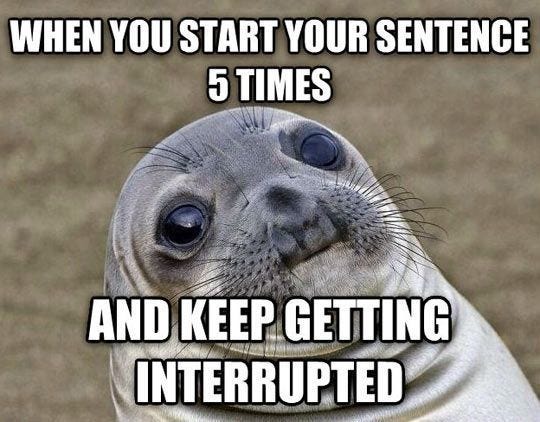5 Little Habits to Improve Your Communication
You may have not heard about them yet.
Communication is everything.
But if I tell you: “Listen more.” or “Use empathy.” Maybe you’ll hit your forehead and laugh. You know it already.
No, I want you to do something a little different.
Be present in conversations.
Here are 5 habits that will help you leverage your presence and show you are an attentive listener and solution contributor: tactical interruptions, honesty with a tea bag, silent stare, whys, and one-sentence summaries.
1. Tactical interruptions
“You should not interrupt people. It’s disrespectful.”
If you are like me, you watch out not to interrupt. However, what if interruptions are not disrespectful all the time?
You probably hate being interrupted. “It’s my time to shine, so let me speak!” Yes, generally, interruptions are annoying, blocking communication, and hindering relationship-building.

Yet, tactical interruptions are needed whenever:
The conversation is veering off course.
The conversation is becoming unproductive.
The conversation is getting too heated.
You don’t have to go with the flow. At the moment, interruption is the best thing you can do.
Everyone will benefit from such an interruption because it sharpens focus, keeps meetings on track, and demonstrates assertiveness. While assertiveness could be considered impolite, it can earn you respect in high-stakes environments.
So, you definitely need to interrupt people sometimes. Otherwise, your day might be pretty long and unproductive.
2. Brutal honesty with a tea bag
What happens to a tea bag when you put it into boiling water? It softens and fuses the goodness.
Hmnm. I am smelling fresh tea already.
My friend loves being brutally honest. Like really. He has no filter at all. It gets him in trouble all the time. So, when I say be brutally honest, I want you to remember to make tea.
Honesty is the best policy in leadership. Be direct and transparent in your feedback, but balance it with a constructive approach.
Clear and unfiltered communication cuts through corporate politeness. But you still want to work with people in a friendly way. So, say things as they are and have efficiency, feelings, and improvements on your mind.
Telling someone about their mistake can hurt their feelings. Avoid using too emotionally charged words like:
You disappointed me.
This was a failure.
You are lazy.
The mistake was ridiculous.
You should have known.
Tea bag helps you keep it clear and honest without being brutal.
This didn’t meet the quality standards.
This didn’t work out as planned.
It seems like there was a lack of effort in this area.
This mistake was unexpected and could have been avoided.
This is something that could have been anticipated.
Such statements may seem too formal and clumsy, but you get the idea of how you can go around emotionally charged sentences.
3. Silent stare
You know these meetings. You are discussing something, and there is this vague or evasive answer. What do you do?
Keep talking?
Sweep it around and keep going?
Say: “Whaaaat?”
How about maintaining eye contact and staying silent for a few extra seconds? Silence feels awkward, but it is a powerful communication moment.
This little habit works so well. When you are silent, it creates discomfort and prompts the other person to fill the silence. This can lead to more honest and detailed responses.
Silence, my friend, is often more than trying to be extra polite, clear, or friendly.
Btw. when you lift your eyes and stay silent, it is a sign you’re thinking. Very useful for feedback conversations.
4. Challenge statements & why’s
People often wonder about how to be more '“curious”. It is simple. Ask more whys.
Notice how much you ask “why”. During meetings, you hear what and how, but why is often missing.
Imagine sitting in front of your client, and they are presenting an idea or a plan. You may think: “Why do they want to do it like this? It does not make sense.”
Now, it is time to ask you questions in real. Unexpected questions that challenge assumptions lead to better understanding and alignment.
Make “why” your habit. This habit is critical if you want to solve problems effectively and be a good partner in conversation.
Why forces deeper consideration of ideas and helps decision-making.
Why is this important?
Why why why!
Why are you reading this?
5. One-sentence summary for clarity
My English teacher didn’t praise how many vocabularies we knew, but the art of answering to anything. My friend was THE master of short sentences. He was great, and he made the conversation flow.
Likewise, in the business environment, you read hundreds of emails daily. There are lengthy meetings and conversations. What is the outcome?
Learn to summarize discussions or email threads in a one-sentence summary. Include key points or decisions in one concise sentence.
Don’t say: “I will do it.” Instead, be specific and clear. “I will write the meeting minutes.”
One-sentence summaries are such a great habit. They eliminate ambiguity, ensure alignment, and get the core message across.
No more buzzwords. No corporate noise.
Pure action.
This also helps with accountability. End every meeting with one sentence. Miracles will happen.
TL;DR
It takes five habits to become a better communicator:
Interrupt tactically
Brew honesty tea
Stare
Ask why
Summarize with one sentence.
Practice and let me know how it is going for you. Let’s go to work now! Ivona
Monday Deep Dive: Strategies to Learn New Skills
Thursday Newsletter: What Lead by Example Means





